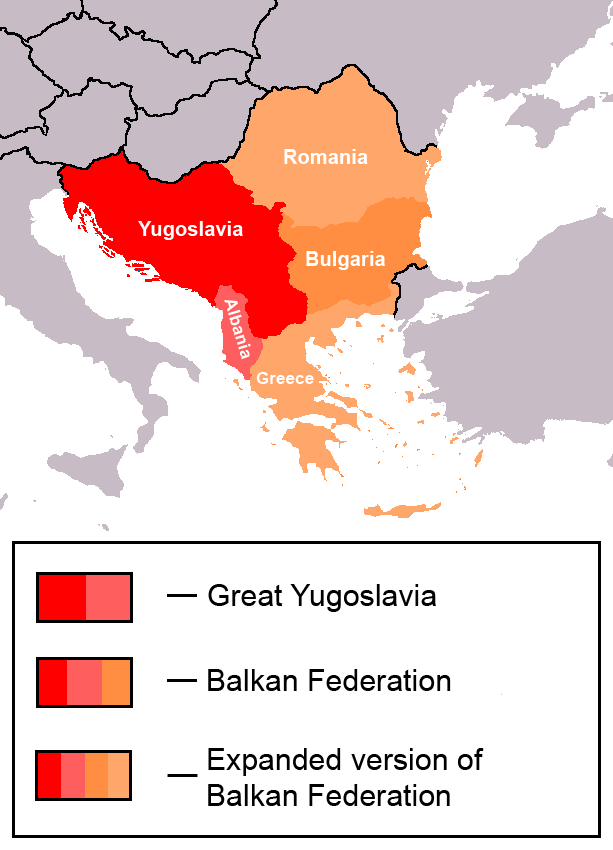|
Internal Dobrujan Revolutionary Organization
The Internal Dobrujan Revolutionary Organisation ( bg, Вътрешна добруджанска революционна организация; ro, Organizația Revoluționară Internă Dobrogeană) or IDRO was a Bulgarian nationalist and revolutionary organisation active in Romanian Dobruja from 1923 to 1940. It was labeled a terrorist organization by the Romanian government, though in Bulgaria it was regarded as a liberation movement. The organisation was founded in 1923 under the leadership of Docho Mihaylov and on the basis of the Great Convention of Dobruja (Велик добруджански събор), a Bulgarian political organisation established in 1919 to fight against Romanian rule in Southern Dobruja. The IDRO detachments fought against the widespread brigandage in the region, as well as the Romanian administration in the region. Like the Internal Macedonian Revolutionary Organisation in Macedonia and the Internal Thracian Revolutionary Organisation in Thrace, ID ... [...More Info...] [...Related Items...] OR: [Wikipedia] [Google] [Baidu] |
Bulgarian Communist Party
The Bulgarian Communist Party (BCP; bg, Българска Комунистическа Партия (БКП), Balgarska komunisticheska partiya (BKP)) was the founding and ruling party of the People's Republic of Bulgaria from 1946 until 1989, when the country ceased to be a socialist state. The party had dominated the Fatherland Front, a coalition that took power in 1944, late in World War II, after it led a coup against Bulgaria's tsarist regime in conjunction with the Red Army's crossing the border. It controlled its armed forces, the Bulgarian People's Army. The BCP was organized on the basis of democratic centralism, a principle introduced by the Russian Marxist scholar and leader Vladimir Lenin, which entails democratic and open discussion on policy on the condition of unity in upholding the agreed upon policies. The highest body of the BCP was the Party Congress, convened every fifth year. When the Party Congress was not in session, the Central Committee was the hig ... [...More Info...] [...Related Items...] OR: [Wikipedia] [Google] [Baidu] |
History Of Dobruja
Dobruja or Dobrudja (; bg, Добруджа, Dobrudzha or ''Dobrudža''; ro, Dobrogea, or ; tr, Dobruca) is a historical region in the Balkans that has been divided since the 19th century between the territories of Bulgaria and Romania. It is situated between the lower Danube River and the Black Sea, and includes the Danube Delta, Romanian coast, and the northernmost part of the Bulgarian coast. The territory of Dobruja is made up of Northern Dobruja, which is part of Romania, and Southern Dobruja, which is part of Bulgaria. The territory of the Romanian region Dobrogea is organised as the counties of Constanța and Tulcea, with a combined area of and a population of slightly less than 900,000. Its main cities are Constanța, Tulcea, Medgidia and Mangalia. Dobrogea is represented by dolphins in the coat of arms of Romania. The Bulgarian region Dobrudzha is divided among the administrative regions of Dobrich and Silistra; the following villages of Razgrad Province ... [...More Info...] [...Related Items...] OR: [Wikipedia] [Google] [Baidu] |
1920s In Romania
Nineteen or 19 may refer to: * 19 (number), the natural number following 18 and preceding 20 * one of the years 19 BC, AD 19, 1919, 2019 Films * ''19'' (film), a 2001 Japanese film * ''Nineteen'' (film), a 1987 science fiction film Music * 19 (band), a Japanese pop music duo Albums * ''19'' (Adele album), 2008 * ''19'', a 2003 album by Alsou * ''19'', a 2006 album by Evan Yo * ''19'', a 2018 album by MHD * ''19'', one half of the double album ''63/19'' by Kool A.D. * ''Number Nineteen'', a 1971 album by American jazz pianist Mal Waldron * ''XIX'' (EP), a 2019 EP by 1the9 Songs * "19" (song), a 1985 song by British musician Paul Hardcastle. * "Nineteen", a song by Bad4Good from the 1992 album '' Refugee'' * "Nineteen", a song by Karma to Burn from the 2001 album ''Almost Heathen''. * "Nineteen" (song), a 2007 song by American singer Billy Ray Cyrus. * "Nineteen", a song by Tegan and Sara from the 2007 album '' The Con''. * "XIX" (song), a 2014 song by Slipknot. ... [...More Info...] [...Related Items...] OR: [Wikipedia] [Google] [Baidu] |
1920s In Bulgaria
Nineteen or 19 may refer to: * 19 (number), the natural number following 18 and preceding 20 * one of the years 19 BC, AD 19, 1919, 2019 Films * ''19'' (film), a 2001 Japanese film * ''Nineteen'' (film), a 1987 science fiction film Music * 19 (band), a Japanese pop music duo Albums * ''19'' (Adele album), 2008 * ''19'', a 2003 album by Alsou * ''19'', a 2006 album by Evan Yo * ''19'', a 2018 album by MHD * ''19'', one half of the double album ''63/19'' by Kool A.D. * ''Number Nineteen'', a 1971 album by American jazz pianist Mal Waldron * ''XIX'' (EP), a 2019 EP by 1the9 Songs * "19" (song), a 1985 song by British musician Paul Hardcastle. * "Nineteen", a song by Bad4Good from the 1992 album '' Refugee'' * "Nineteen", a song by Karma to Burn from the 2001 album ''Almost Heathen''. * "Nineteen" (song), a 2007 song by American singer Billy Ray Cyrus. * "Nineteen", a song by Tegan and Sara from the 2007 album '' The Con''. * "XIX" (song), a 2014 song by Slipknot. ... [...More Info...] [...Related Items...] OR: [Wikipedia] [Google] [Baidu] |
Bulgarian Revolutionary Organisations
Bulgarian may refer to: * Something of, from, or related to the country of Bulgaria * Bulgarians, a South Slavic ethnic group * Bulgarian language, a Slavic language * Bulgarian alphabet * A citizen of Bulgaria, see Demographics of Bulgaria * Bulgarian culture * Bulgarian cuisine, a representative of the cuisine of Southeastern Europe See also * * List of Bulgarians, include * Bulgarian name, names of Bulgarians * Bulgarian umbrella, an umbrella with a hidden pneumatic mechanism * Bulgar (other) * Bulgarian-Serbian War (other) The term Bulgarian-Serbian War or Serbian-Bulgarian War may refer to: * Bulgarian-Serbian War (839-842) * Bulgarian-Serbian War (853) * Bulgarian-Serbian wars (917-924) * Bulgarian-Serbian War (1330) * Bulgarian-Serbian War (1885) * Bulgarian-Serbi ... {{disambiguation Language and nationality disambiguation pages ... [...More Info...] [...Related Items...] OR: [Wikipedia] [Google] [Baidu] |
Internal Western Outland Revolutionary Organisation
The Western (Bulgarian) Outlands () is a term used by Bulgarians to describe several regions located in southeastern Serbia. The territories in question were ceded by Bulgaria to the Kingdom of the Serbs, Croats and Slovenes in 1920 as a result of the Treaty of Neuilly, following the First World War. According to the Serbian census of 2011, two towns in the Western Outlands, Bosilegrad and Dimitrovgrad, are populated primarily by Bulgarians. Internal Western Outland Revolutionary Organization The Internal Western Outland Revolutionary Organization ( bg, Вътрешна западнопокрайска революционна организация, Vatreshna zapadnopokrayska revolyutsionna organizatsiya), IWORO, was a Bulgarian separatist organization active in the Western Outlands between 1921 and 1941 in the Kingdom of Serbs, Croats and Slovenes (until 1929), and then its successor, the Kingdom of Yugoslavia. The organization was established in 1921 on the basis of seve ... [...More Info...] [...Related Items...] OR: [Wikipedia] [Google] [Baidu] |
Internal Revolutionary Organisation
The Internal Revolutionary Organisation ( bg, Вътрешна революционна организация) or IRO was a Bulgarians, Bulgarian revolutionary organisation founded and built up by Bulgarian revolutionary Vasil Levski in the period between 1869 and 1871. The organisation represented a network of regional revolutionary committees which were governed by a Central Committee in the town of Lovech. The foundation of IRO reflected Levski's ideas that the centre of revolutionary activity be transferred from the Bulgarian emigrant circles in Romania to Bulgaria proper. In 1871, Levski prepared the Charter of the organisation in the spirit of his own political views: liberation of Bulgaria from the Ottoman Empire, Ottomans through a nationwide revolution and establishment of the country as a democratic republic with guarantees for the equality of all of its citizens regardless of their ethnicity or religion. By the end of 1872, both Levski and Lyuben Karavelov, the chairman ... [...More Info...] [...Related Items...] OR: [Wikipedia] [Google] [Baidu] |
Treaty Of Craiova
The Treaty of Craiova ( bg, Крайовска спогодба, Krayovska spogodba; ro, Tratatul de la Craiova) was signed on 7 September 1940 and ratified on 13 September 1940 by the Kingdom of Bulgaria and the Kingdom of Romania. Under its terms, Romania had to allow Bulgaria to retake Southern Dobruja, which Romania had gained after the 1913 Second Balkan War. Bulgaria had to pay 1 million lei as compensation for the investment provided to the region by Romania. The treaty stipulated that a population exchange between Bulgaria and Romania had to be made. Thus, 103,711 Romanians, Aromanians and Megleno-Romanians living in Southern Dobruja were forced to move to Northern Dobruja (part of Romania), and 62,278 Bulgarians located in the north were forcibly moved to the south. The Dobrujan Germans, who were affected by these relocations, would eventually be transferred to Nazi Germany. Unlike all other territorial treaties mediated by Nazi Germany, the Treaty of Craiova was ... [...More Info...] [...Related Items...] OR: [Wikipedia] [Google] [Baidu] |
Soviet Union
The Soviet Union,. officially the Union of Soviet Socialist Republics. (USSR),. was a transcontinental country that spanned much of Eurasia from 1922 to 1991. A flagship communist state, it was nominally a federal union of fifteen national republics; in practice, both its government and its economy were highly centralized until its final years. It was a one-party state governed by the Communist Party of the Soviet Union, with the city of Moscow serving as its capital as well as that of its largest and most populous republic: the Russian SFSR. Other major cities included Leningrad (Russian SFSR), Kiev (Ukrainian SSR), Minsk ( Byelorussian SSR), Tashkent (Uzbek SSR), Alma-Ata (Kazakh SSR), and Novosibirsk (Russian SFSR). It was the largest country in the world, covering over and spanning eleven time zones. The country's roots lay in the October Revolution of 1917, when the Bolsheviks, under the leadership of Vladimir Lenin, overthrew the Russian Provisional Government ... [...More Info...] [...Related Items...] OR: [Wikipedia] [Google] [Baidu] |
Balkan Communist Federation
The Balkan Federation project was a left-wing political movement to create a country in the Balkans by combining Yugoslavia, Albania, Greece, Bulgaria, Romania and Turkey. The concept of a Balkan federation emerged in the late 19th century from among left political forces in the region. The central aim was to establish a new political unity: a common federal republic unifying the Balkan Peninsula on the basis of Internationalism (politics), internationalism, socialism, social solidarity, and economic equality. The underlying vision was that despite differences among the Balkan peoples the historical need for emancipation was a common basis for unification. This political concept went through three phases in its development. In the first phase the idea was articulated as a response to the collapse of the Ottoman Empire at the beginning of the 20th century. In the second phase, mostly through the interwar period (1919–1936), the idea of the Balkan federation was taken up by the B ... [...More Info...] [...Related Items...] OR: [Wikipedia] [Google] [Baidu] |
League Of Nations
The League of Nations (french: link=no, Société des Nations ) was the first worldwide intergovernmental organisation whose principal mission was to maintain world peace. It was founded on 10 January 1920 by the Paris Peace Conference that ended the First World War. The main organization ceased operations on 20 April 1946 but many of its components were relocated into the new United Nations. The League's primary goals were stated in its Covenant. They included preventing wars through collective security and disarmament and settling international disputes through negotiation and arbitration. Its other concerns included labour conditions, just treatment of native inhabitants, human and drug trafficking, the arms trade, global health, prisoners of war, and protection of minorities in Europe. The Covenant of the League of Nations was signed on 28 June 1919 as Part I of the Treaty of Versailles, and it became effective together with the rest of the Treaty on 10 January 1920. T ... [...More Info...] [...Related Items...] OR: [Wikipedia] [Google] [Baidu] |




